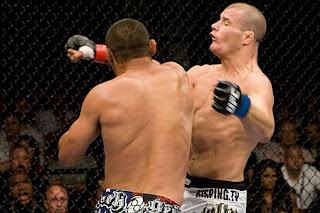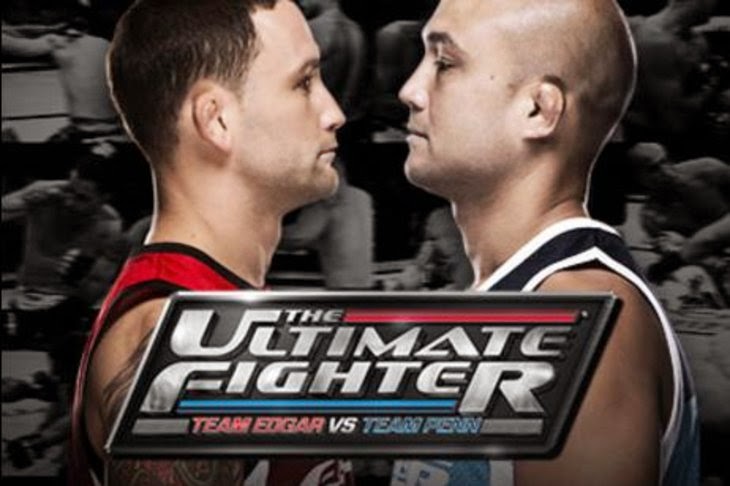 By E. Spencer Kyte (espencerkyte@mmaratings.net)
By E. Spencer Kyte (espencerkyte@mmaratings.net)
Yesterday, we discussed the Yves Lavigne fallout from UFC 102 and the precarious position that referees are in when officiating MMA bouts.
One very interesting thought that came to me at the close of yesterday’s article was the strange double standard in place where referees are criticized for their action or in-action, while fighters are praised for fighting until the bell, even when that means throwing an unnecessary blow or two.
The question for today is: Shouldn’t fighter safety fall on everyone, the fighters included?
I once again turn to the Dan Henderson’s fight against Michael Bisping at UFC 100 to begin this discussion, much to my friend and colleague Katrina Belcher’s dismay.
By now everyone has seen the clips and heard the comments; Hendo landed a deadly right hand to Bisping’s jaw, knocking him out cold before following his fallen opponent to the mat with an additional forearm to the head.
While many will say that fighters are taught to keep going until the ref stops you, and cite things like football where you “play to the whistle,” Henderson himself admitted that it was an unnecessary blow, intended “to shut him up.”
Conversely, UFC 102 gave us a terrific example of restraint and intelligence in the form of Nathan Marquardt.
Just 20 seconds into his fight with Demian Maia, the former King of Pancrase landed a deadly right hand that sent the jiu jitsu ace spinning in the air before crashing to the mat face-first. Marquardt stood over his opponent, fist clenched, ready to deliver another blow, but stopped himself.
Some have called this a mistake, saying Marquardt would look like a fool if Demian Maia had rolled into a kneebar and ended the fight.
Exactly how many times have we seen fighters get drilled in the jaw, spin in the air, land on their head and roll into a kneebar to end a fight?
Marquardt knew his opponent was finished and saw no reason to inflict more punishment and should be applauded for his class, restraints and protecting his fellow fighter.
We criticize the referees when fights go on too long, shouting about fighter safety, but disregard that same stance when we think fights are stopped too early.
And why is fighter safety the sole responsibility of the referee?
Each man or woman who takes that ring should have concern for the other people in the ring, and for the most part they do.
That is why you see the victor go over and check on their fallen opponent more often than not, and why restraint like Nate Marquardt showed should be applauded.
Delivering another strike to a clearly dazed Maia wouldn’t have changed the outcome of the fight; Maia was already out and Marquardt knew that, so why throw another punch just because the referee hasn’t jumped in front of you?
Dan Henderson has been fighting long enough to know that he can knock people out with his right hand.
Everyone watching that fight knew Dan Henderson could knock people out with his right hand, except for maybe Michael Bisping.
So when Hendo connected and Bisping fell to the ground like a sack of potatoes, the former Pride champion should be acutely aware that his British counterpart wasn’t going to get back up.
While the referee may not have been in position to “save” Bisping at that time, a small part of Henderson should also be thinking about saving Bisping from any further injury, not landing one more shot to shut him up.
Though clearly within the rules, Henderson himself later acknowledged it was not needed, cutting the legs out from under anyone who wants to argue differently, though I know you still will… and I like that.
Matt Hughes released an armbar on Royce Gracie back when they met at UFC 60, knowing Gracie would not tap and he would have to break the legend’s arm. He still went on to win the fight in dominant fashion, and Gracie had use of both arms.
Matt Brown looked at Lavigne in amazement when his fight with Pete Sell wasn’t initially stopped, knowing Sell was done and not seeing any reason to continue the beatdown.
In both these instances, the fighters showed care for the safety and well-being of their opponent and it didn’t diminish their performance one bit.
Additionally, there is a great difference between a hurt opponent and a beaten opponent.
Scott Smith was hurt when Pete Sell drilled him in the ribs; he wasn’t on the mat, he wasn’t verbally submitting. He was buckled over in pain and went right back to that position after dropping Sell with a now legendary right.
In his UFC 101 match against Anderson Silva, Forrest Griffin was beaten and looked out for his own safety by tapping.
While some speak ill of tapping as if it is a sign of weakness, Griffin knew he was done and didn’t want to take any more punishment. You can call him whatever names you want for tapping; I applaud him for knowing when he’d had enough and protecting himself accordingly.
Chris Leben should have taken the same route on Saturday night, knowing Jake Rosholt’s arm triangle was tight and he wasn’t going to escape. But Leben said after the fight that he’d “never tap in his hometown” or something along those lines.
Apparently getting choked unconscious and convulsing on the canvas is more noble than admitting defeat and protecting yourself.
There is no question that referees have to act in the best interest of the fighters and have their safety as their primary concern.
But the onus isn’t just on them.
The fighters need to protect themselves, and their opponents.
Maybe that’s why they always seem to say that when fighters meet in the center of the ring…



